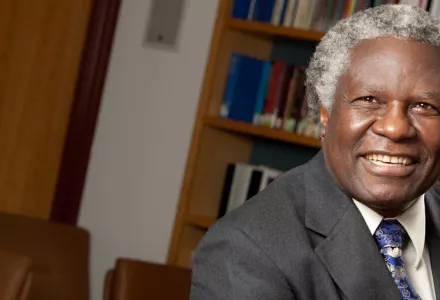
Calestous Juma: 9 June 1053 - 15 December 2017
Calestous Juma was a highly respected and beloved member of the Harvard Kennedy School/Belfer Center community from 1999 to his passing in 2017. This biographical memoir by Norman G. Clark was written for The Royal Society, of which Calestous was an elected fellow.
Until his untimely death in December 2017 Professor Calestous Juma was an internationally- recognized authority and leader in the application of science, engineering and innovation to sustainable development in developing and developed countries. His continuing original work focused on analysing the co-evolution of technological innovation and institutional change in socio-economic systems. He ran programmes that advanced science, technology and innovation policy research, especially biotechnology, provided high-level science and technology advice and promoted the conservation of biological diversity. Juma was a Kenyan national and US permanent resident.
Introduction
The story of Calestous Juma is a truly remarkable one. He was born and raised in the relative poverty of rural western Kenya near Lake Victoria with few of the advantages open to most. However, with the inspiration of his parents and the support of an increasing number of mentors, he broadened his horizons, explored educational possibilities and, through sheer hard work and an enquiring mind, rose to become one of Africa’s leading authorities on the use of technology in developing countries. He did not follow the normal path of academic progress— primary and secondary school, university, graduate school, post-doc training and specialist single-discipline research/publication. Indeed, for long periods in his early youth he seems not to have thought in such terms, instead realizing through his education and experiences that the world is a truly interesting place where there is so much to learn and so little time to understand and consolidate this learning.
Perhaps for this reason he never became narrowly focused on the conventional channels of academia, but rather set out almost on his own to understand how things functioned, where they failed to do so and how this could be remedied. Formal education was an essential key to all this, but he came to realize that it could not be fitted neatly into boxes. Rather, it should also be sought in terms of practical relationships and how these can be used to improve the human condition. It was from here that he embarked on a career as a school teacher and journalist. This later morphed into more formal academic work, influenced especially by his graduate studies at the University of Sussex in the UK. The Science Policy Research Unit (SPRU) had been established by Christopher Freeman and Asa Briggs in the 1960s with a cognate philosophy, and Juma’s arrival there proved seminal. From then on, his work took on an evolutionary flavour focusing on how best science and technology education and practice could be used for the betterment of all.
G. Clark, Norman. “Royal Society Biographical Memoir - Calestous Juma.” The Royal Society, June 2021
The full text of this publication is available via The Royal Society.


